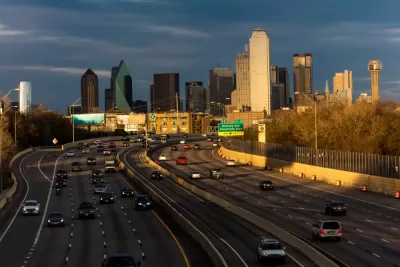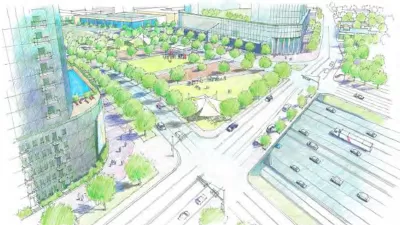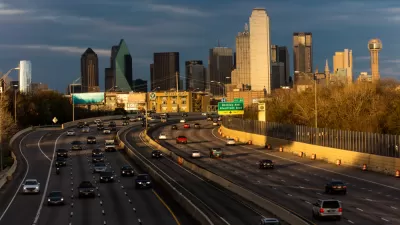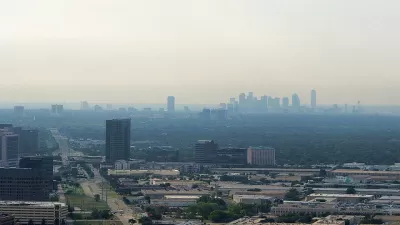A plan to widen the Interstate 30 in Dallas is pitting state transportation officials, with ostensible goals to serve regional transportation needs, against local officials, who are more concerned with "neighborhood-centric ideals."

Robert Wilonsky reports on the local resistance to a state plan to widen Interstate 30 in the heart of Dallas. The resistance is coming from City Hall.
"The Texas Department of Transportation last May sent Dallas City Hall a sneak peek at its plans to redo Interstate 30 East, from downtown past Fair Park to Haskell Avenue," writes Wilonsky, who goes on to describe the reaction of local officials.
Shocked because the state's transportation agency proposed to make the highway wider, with more lanes, exit ramps and frontage roads. Shocked because the design created more barriers between downtown and East Dallas, the Cedars, Fair Park and Deep Ellum, and gobbled up enormous swaths of real estate that could be used for development instead of more concrete. And shocked because TxDOT had proposed something that went against its very own CityMAP, the design document City Hall wholeheartedly embraced in the summer of 2016.
The Dallas Transportation Department has been working on a rebuttal, presenting the document [pdf] to the City Council's Mobility Solutions, Infrastructure, and Sustainability Committee this week. Local officials are hoping for the renovation of I-30 to reconnect South Dallas and Downtown while helping to revitalize Fair Park. The Dallas Transportation Department thus has proposed eight guiding principles it hopes the state will use to guide future refinements of the highway plan.
FULL STORY: Dallas City Hall beats back TxDOT's early plans for I-30's $1.3 billion makeover

Planetizen Federal Action Tracker
A weekly monitor of how Trump’s orders and actions are impacting planners and planning in America.

Maui's Vacation Rental Debate Turns Ugly
Verbal attacks, misinformation campaigns and fistfights plague a high-stakes debate to convert thousands of vacation rentals into long-term housing.

Restaurant Patios Were a Pandemic Win — Why Were They so Hard to Keep?
Social distancing requirements and changes in travel patterns prompted cities to pilot new uses for street and sidewalk space. Then it got complicated.

In California Battle of Housing vs. Environment, Housing Just Won
A new state law significantly limits the power of CEQA, an environmental review law that served as a powerful tool for blocking new development.

Boulder Eliminates Parking Minimums Citywide
Officials estimate the cost of building a single underground parking space at up to $100,000.

Orange County, Florida Adopts Largest US “Sprawl Repair” Code
The ‘Orange Code’ seeks to rectify decades of sprawl-inducing, car-oriented development.
Urban Design for Planners 1: Software Tools
This six-course series explores essential urban design concepts using open source software and equips planners with the tools they need to participate fully in the urban design process.
Planning for Universal Design
Learn the tools for implementing Universal Design in planning regulations.
Heyer Gruel & Associates PA
JM Goldson LLC
Custer County Colorado
City of Camden Redevelopment Agency
City of Astoria
Transportation Research & Education Center (TREC) at Portland State University
Jefferson Parish Government
Camden Redevelopment Agency
City of Claremont





























